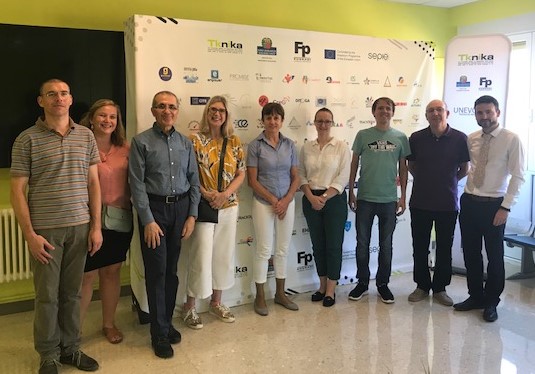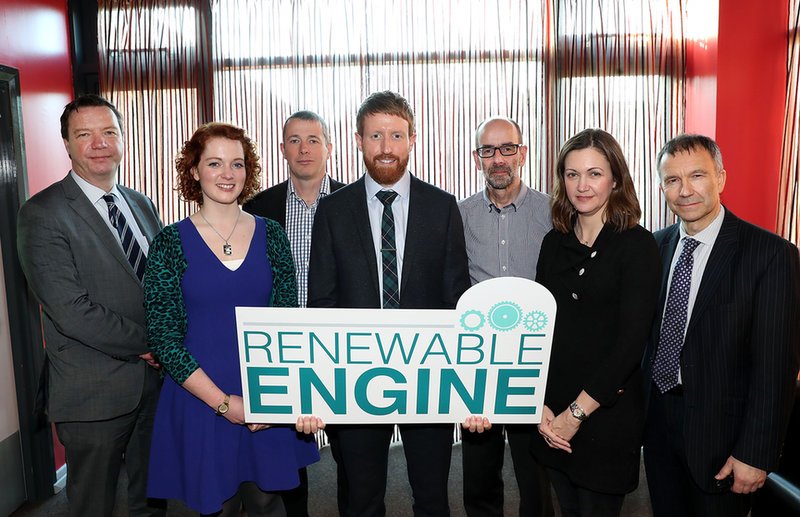FEature
Green innovations powered by two engines of change
The IKE Institute and its partner organisations have set up two engines of change to support innovation and renewable energy. Here we hear about the work of the Creative Engine and the Renewable Engine projects.
One single word holds the key as to whether those 2030 climate targets of the forthcoming COP26 will be hit or not: innovation.
This isn’t a sweeping statement of populist sensationalism, but an actual fact. Innovation is talked about everywhere from the boardroom to the workshop, but unless we pay more than just lip service to it, we’ll never hold back the tide of climate change.
South West College (SWC) in Northern Ireland has recognised this and has launched a two-pronged attack, focusing on underpinning innovation skills whilst driving up capability in sustainable technologies within the advanced manufacturing and engineering sectors.
Creative Engine: innovation as a taught discipline
As the IKE Institute’s NI branch, South West College has a unique positioning that provides its abilities to power up cultural, process and technology innovations in equal measure. As result, it has been leading on Creative Engine, an Erasmus+ trans-European project that started three years ago.
By market investigation, innovation needs in industry have been clarified, and these gaps have been closed through development of targeted innovation learning resources. IKE Institute led on the initial research study, assessing responses from 240 engineering companies across the project’s partner European countries. The findings from respondents informed and shaped the way in which the learning outcomes for Creative Engine were developed.
From the start, the need was apparent, with four in every five companies stating they ‘didn’t consider their creativity and innovation training needs were being fulfilled’ and 75% of respondents stating they ‘didn’t have a structured approach to innovation’.
With the research study highlighting the way, Creative Engine leapt up several gears. SWC, along with partners IKE Institute in London, Dublin City University in Ireland, Thomas More in Belgium and Tknika in Spain, has pioneered the creation of an integrated creativity and innovation course that will be offered to academic and vocational institutions to support innovation teaching and learning in their engineering and technology programmes.
Innovation as a taught discipline provides the fundamental underpinning to help organisations come up with coherent, workable solutions to the toughest problems.
The course covers creativity and ideas management, innovation culture, innovation process and planning, innovation strategy and evaluation, customer analysis and market analysis.
In addition to the learner-focused course, Creative Engine partners designed a teacher training programme to provide the requisite knowledge for any lecturer to take the Creative Engine learner course and teach it, with pedagogies specific to innovation teaching and examples on how creativity and innovative thinking can be inspired.
With this project coming to its natural end in August 2021, the legacy of Creative Engine will live on through the Creative Engine Campus. A free online offering run on Moodle VLE, Creative Engine Campus offers immediate access to innovation learning and development materials. It enables learners to upskill anywhere and track their progression as they pass through each of the six integrated learning units.
However, these courses aren’t just another set of resources to support an individual’s training and development goals. They offer a direct path to change, to growth and to success. Innovation as a taught discipline provides the fundamental underpinning to help organisations come up with coherent, workable solutions to the toughest problems. And climate change is one of the toughest ever.

The Creative Engine team (left to right): Stefan Haesen, An Conings, Sa'ad Sam Medhat (IKE Institute), Michelle Medhat (IKE Institute), Anne Morrissey, Julie Anderson, Javier Larroda, Victor Arias and James Carton.
Renewable Engine: supporting clean energy innovation
Dovetailing into that innovation focus on climate change has been SWC’s work leading another European project, known as Renewable Engine (RE), under the EU’s Interreg VA programme.
It’s a project that wouldn’t have come into fruition for SWC without its prior experience and extensive body of knowledge acquired through its CREST Sustainability Centre.
RE supports research and development work at PhD level and above in renewables and eco-engineering alongside ten organisations ranging from micro-sized to multinational, working in harmony to find answers in the critical areas of energy generation, energy storage and enabling technologies.
RE’s industrial partners include B9 Energy Storage, Booth Welsh, Caley Ocean Systems (in collaboration with Industrial Systems & Control), Doosan Babcock, Kastus Technologies, Kingspan Water and Energy, Organic Power, Platinum Tanks, RotoSim and Soltropy.
Working alongside SWC are leading institutions – Queens University Belfast, Advanced Forming Research Centre University of Strathclyde and Institute of Technology Sligo. This cross-border collaboration and co-creation project offers further grants to five enterprises for technology development in areas showing commercial potential.
Through its work in these ground-breaking EU projects, SWC has built a significant capability in leading-edge manufacture and engineering practices underpinned by its use of innovative tools, technologies and techniques.
Across the projects, there is a significant focus on advanced manufacture and engineering with the development of new, innovative smart materials and processes to support the renewables industry.
Within RE, there are projects aimed at:
- Wind energy, such as the development of a new rotomoulding simulation and modelling software specifically for the renewables energy sector;
- The creation of large, low cost and lightweight multilayered rotomoulded structures for offshore wind farms that offer an alternative to steel, but are resilient enough to overcome challenging marine environments;
- Research into advanced control methods to enable high performance lifting from floating vessels for installation and maintenance of offshore wind platforms;
- An industry 4.0 project incorporating augmented reality to provide digital twinning of wind farms, aiding remote maintenance and control of such rigs.
RE has given attention to the rural community, supporting farmers with off-grid energy generation through innovations such as combining new thermoplastic composite materials with new rotational moulding techniques to develop new solar frames and development of robust, modular and small-scale anaerobic digestion systems enabling 24/7 power supply for farms.
The aspect of energy storage, often a bugbear in renewable tech, has also been targeted by RE. With projects such as the development of a novel isothermal compressed air energy system using liquid piston technology, and the use of smart or phase-change materials to enable thermal energy storage inside solar collectors providing pre-heating before entry into a combi-boiler, energy storage innovations are coming to the fore.

The Renewable Engine team (left to right): Professor John Bartlett (IT Sligo), Dr Rachel Coulter (formerly of SWC), Dr Mark McCourt (Queen’s University Belfast), Dr Alistair Quinn (SWC), Terry Waugh (Action Renewables), Dawn Murphy (Action Renewables), Professor Paul Blackwell (University of Strathclyde).
Through the project, new energy efficient products and processes are being founded by leaps in physiochemistry. Conversion of materials into their greener component parts using nanocatalysts converting CO2 into renewable fuels like hydrogen, first-gen PV modules being recycled through pyrolysis – a thermochemical conversion process – into sustainable materials, and photocatalysts being used to create energy efficient LEDs, support the journey to a greener, circular economy.
Even transitioning to green power is being supported by a project within RE using AI algorithms to find and visualise the best economics, energy performance and social benefit optimisation metrics for an organisation anticipating a move toward sustainable energy systems.
Through the AMEC Hub, a state-of-the-art engineering and training facility, emerging technologies will be leveraged helping to boost the region’s digital drive and grow a sustainable workforce.
Through its work in these ground-breaking EU projects, SWC has built significant capability in leading-edge manufacture and engineering practices underpinned by its use of innovative tools, technologies and techniques. This makes SWC the natural home for the Advanced Manufacturing and Engineering Curriculum (AMEC) Hub.
This next stage in development, supported by its IKE Institute NI branch status, will see SWC supporting clusters of global high-growth manufacturing firms with targeted professional and technical skills provision.
Through the AMEC Hub, a state-of-the-art engineering and training facility, emerging technologies will be leveraged helping to boost the region’s digital drive and grow a sustainable workforce, who are ready to contribute and build new, game-changing innovations that will, perhaps, solve some of those world-level challenges.
Authors:
Michelle N Medhat, operations and strategic development director, IKE Institute
Alistair Quinn, Renewable Engine programme manager, South West College & IKE Northern Ireland
Clodagh O’Neill, international project development manager, South West College & IKE Northern Ireland